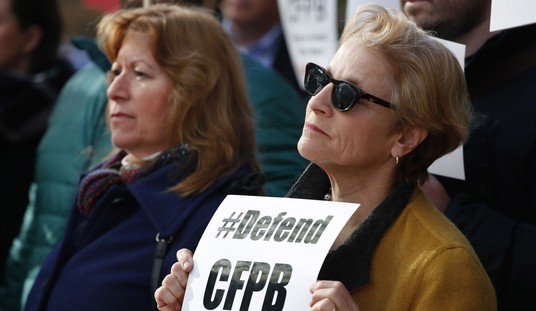As the tit-for-tat tariff war continues between President Donald Trump and dictator Xi Jinping's China, the Chinese economy is showing the first signs of a significant downturn as U.S. tariffs begin to squeeze U.S. importers -- who pay those tariffs, as opposed to, as some believe, China paying them to the U.S.
As a result, Chinese exporters are now being hit by a significant decrease in U.S. orders, which is in turn also beginning to hurt Chinese factory production.
As reported by the Wall Street Journal on Wednesday, survey results published by China’s National Bureau of Statistics showed that new export orders fell in April to the lowest reading since COVID-19 ravaged the country and much of the world in 2022, while overall manufacturing activity in China was the weakest in more than a year.
So what does all of this mean?
The answer(s) largely depend on who's answering the question -- and with what objective in mind.
But one thing it clearly means is that Xi Jinping is likely under growing pressure to reach a trade deal with Trump -- yet for now, the clear message coming from Xi and his pals in Beijing is one of resolute defiance against what the ChiComs laughably describe as Trump's "unilateral bullying and coercive practice," which is beyond hypocrisy from China's genocidal regime.
ALSO CHECK OUT: Tit-For-Tat Continues: China Hikes Tariffs on US Imports to 125 Percent, Calls Trump's Policies 'a Joke'
China's Greatest Threat Isn't American Tariffs, but Its Own People’s Dreams of a Better Life
While the ultimate outcome of the trade war -- yes, it's a trade war -- is unknowable, principally because its still in the early stages, what is unknowable by some is that Beijing is first and foremost all about saving face on the world stage, meaning Xi and his pals are loath to be viewed as kowtowing to the United States, much less Donald Trump.
Anyway, in a perfect world of international trade, there would be zero tariffs -- free trade for all, as it were.
But as we well know, not only with respect to world trade but also with interactions between nations and peoples, the world is far from fair. And while some prefer to rely on negotiating skills, others favor bringing down the hammer at every opportunity, the reality lies somewhere in the middle -- particularly when some in the world refuse to play nice.
Here's more, via the WSJ:
Xi has signaled that Beijing is prepared for a long battle over trade. In a social-media post earlier this week, the Chinese government urged other countries not to submit to U.S. pressure and said China will “never kneel down” before Washington.
[And while] Wednesday’s data shows that unyielding strategy will have short-term costs for China’s economy, which last year relied on exports for about a third of its growth. Goldman Sachs estimates that between 10 million and 20 million manufacturing jobs in China depend on U.S. purchases.
Beijing has pledged to boost government borrowing and spending and lift consumption to offset the drag on its economy from a plunge in trade. Even so, economists have slashed their forecasts for Chinese growth this year.
Again, while the ultimate outcome is unknowable, at some point -- particularly if China's economy continues to worsen as a result of U.S. importers cutting, reducing or eliminating various imports from the country -- Xi might very well begin to look over his shoulder, sleep with one eye open, or whatever, fearful of the potential consequences at the hand of the Politburo Standing Committee, China's top decision-making body.
A Final Word About Tariffs
Trump told Time Magazine in an interview released last Friday that permanent high tariffs would be a "total victory,” meaning that import taxes (tariffs, levies, call them whatever you choose; they're still added costs paid to the federal government as high as 50 percent) would be fine with him.
Yet, if the president is truly using tariffs as "leverage," which can be an effective short- to mid-term strategy, what happens if China caves? And other countries? Which would Trump prefer? Making deals or permanent high tariffs, as he told Time?
I suppose these questions might be viewed by some as putting the cart before the horse, but tariff "income" (paid by U.S. importers, not China, Canada, et al.) to the U.S. Treasury, which Trump has suggested multiple times could be used to reduce or eliminate federal income taxes (which will never happen; mark my words), would significantly decrease if "deals are made" with China and the rest of world where tariffs are currently placed on U.S. imports.
I'm not sure who's confused by this whole thing, but I do know that two diametrically opposed things can't happen at the same time. Stay tuned.














